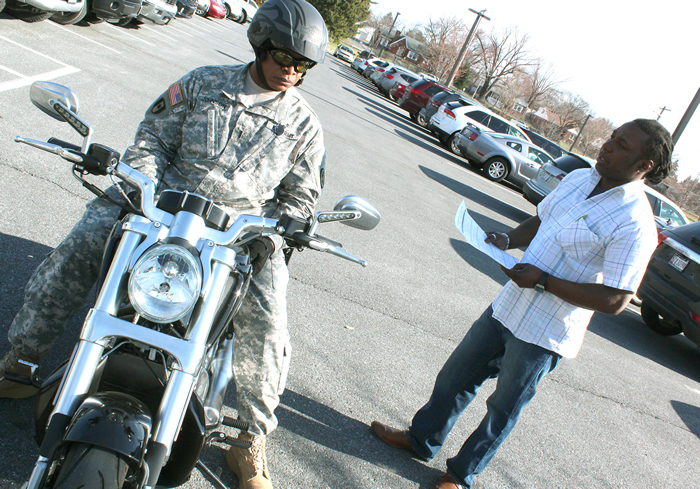Motorcycle Inspections Help Soldiers Ride Safely

Fort Detrick, with its backdrop of the Catoctin Mountains and never-ending country roads that wind through Central Maryland, is a motorcycle rider's dream.
But for Soldiers stationed on post, that dream can quickly turn into a nightmare - if they don't play it safe.
Motorcycle safety includes knowing your bike. Riders must know how things should look and feel for optimal performance. One primary way of knowing your bike is through routine inspections.
"A bike that is routinely inspected not only performs better but also will be more dependable---not to mention safer," said Greg Pugh, who spent seven years in the Army and now works at the U.S. Army Medical Materiel Agency. "Routine inspections give a rider a general idea about the mechanics, as well as the systems of the motorcycle. Inspections also help a rider know what may need to get repaired to reduce premature mechanical or systems failure that could lead to an accident."
Pugh has been riding motorcycles for 23 years. As the weather warms up, he inspects each Soldier's motorcycle at USAMMA to ensure it is in good working order. Annual motorcycle safety inspections are a requirement for all Soldiers who operate motorcycles. Civilian employees may also request courtesy inspections.
The inspection process, developed by the internationally recognized Motorcycle Safety Foundation, is called "T-CLOCS" and includes a thorough review of the bike's:
- Tires
- Controls
- Lights
- Oil
- Chassis
- Sidestand
Pugh also reviews the rider's registration information and gear. Motorcycle drivers and riders on Fort Detrick must wear "approved protective helmets, eye protection, hard-soled shoes, long trousers and brightly colored or reflective outer upper garments," according to Fort Detrick Regulation 190-5.
Helmets are the law - and common sense. Data from the Centers for Disease Control and Prevention cite that helmets reduce the risk of head injury by 69 percent and reduce the risk of death by 37 percent.
Chief Warrant Officer 4 Wendell Johnson, the Chief of USAMMA's National Maintenance Program, completed his inspection with Pugh March 8. Although he has been riding motorcycles for 15 years, he said he still takes the Army's safety process seriously.
"Riders should never be overconfident," said Johnson. "Don't overestimate your skills. Remember your training and respect your gear. When riders forget those things, they can take unnecessary risks and end up hurting themselves or someone else."
To keep new and returning riders sharp, USAMMA also participates in the Army Motorcycle Mentorship Program, which is an established voluntary installation-level motorcycle club where less experienced riders and seasoned riders can create a supportive environment of responsible motorcycle riding.
May is National Motorcycle Safety Awareness Month, sponsored by the National Highway Traffic Safety Administration.
 An official website of the United States government
An official website of the United States government
 ) or https:// means you've safely connected to the .mil website. Share sensitive information only on official, secure websites.
) or https:// means you've safely connected to the .mil website. Share sensitive information only on official, secure websites.


